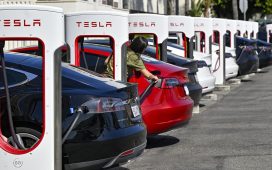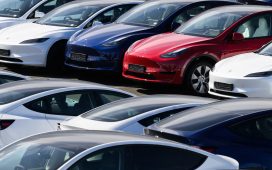Volkswagen Group will launch a pilot project for climate-neutral mobility on the Greek island of Astypalea, in the eastern Aegean sea, as part of the German automaker’s efforts to roll out electric vehicles and curb emissions.
Car- and ride-sharing offerings will help reduce traffic, and vehicles on the island will switch to electric powertrains that will recharge mostly with locally produced renewable energy, VW said Wednesday.
“Our long-term goal is climate-neutral mobility for everyone,” VW CEO Herbert Diess said in a statement. The six-year project will help to determine “how this vision can be reached today already.”
VW is in the midst of a 33 billion-euro ($38.6 billion) push over five years to develop the industry’s biggest lineup of purely battery-powered cars, which will be flanked by numerous hybrid vehicles. Tapping renewable energy sources such as solar power is critical to maximizing environmental benefits, since using coal power to recharge limits emission-reduction efforts.
“Astypalea can and will become a model of sustainable development not just at a national but at a European and a global level,” Greek Prime Minister Kyriakos Mitsotakis said during a virtual event announcing the investment. It can set an example of how small communities can benefit from addressing all problems with new solutions, he said.
VW said in February it was exploring options for an electric-vehicle project in Greece after the country’s foreign ministry mentioned that company officials had visited Kavala and Thassos to sound out options for mobility projects designed for small islands.
The automaker will replace about 1,500 combustion-engine vehicles with 1,000 electric models in Astypalea, including the new ID3 compact and ID4 crossover, as well as e-scooters from the group’s Spanish brand Seat and electric bikes. Police vehicles and cars for other local authorities also will be electrified.
Greece needs to attract investment to bounce back from a decade-long debt crisis that led to a roughly 25 percent drop in economic output. The economy is set to shrink more than 8 percent this year due to the pandemic. While unemployment is expected to fall to 18.6 percent from the crisis peak of nearly 30 percent, the rate remains the highest in Europe.
The Astypalea project is in line with the Greek government’s climate agenda to shift into green energy sources. The government also wants to signal that it can draw foreign companies such as VW and Microsoft Corp. even during the pandemic.
“The Volkswagen project is a vote of confidence in Greece,” Mitsotakis said.








